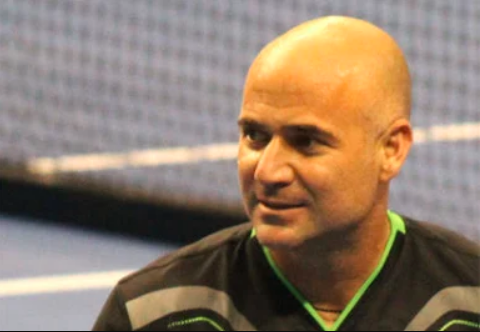
Andre Agassi Early Life and Background
Andre Agassi Origins in the Desert
Andre Kirk Agassi was born on April 29, 1970, in Las Vegas, Nevada, to a family that would profoundly shape his destiny. His father, Emmanuel “Mike” Agassi, was a former Olympic boxer of Armenian descent from Salmas, Iran, who had competed for his native country in the 1948 and 1952 Olympics before immigrating to America. His mother, Elizabeth “Betty” Agassi, was American-born. Andre was the youngest of four children, with brother Philip and sisters Rita and Tamee.
From his earliest days, tennis dominated Andre’s world. He began his tennis career “in diapers,” with his father’s relentless drive serving as both catalyst and burden. Mike Agassi, who had experienced the heights of Olympic competition, possessed an unwavering determination that his son would achieve greatness in tennis. This intensity would create a complex relationship between father and son that would define much of Andre’s early life and career.
At age 13, with his father’s encouragement, Andre left regular schooling and moved to Bradenton, Florida, to attend the renowned Nick Bollettieri Tennis Academy. This decision marked the beginning of a journey that would transform a reluctant teenager into one of the sport’s most compelling figures. Despite his early promise, Agassi actually proved to be an average player among the budding stars at the academy, a humbling experience that would later fuel his determination to excel.
Andre Agassi The Professional Emergence
In 1986, at the age of 16, Agassi became a professional tennis player, making his debut at La Quinta, California. His entry into professional tennis coincided with a period of dramatic change in the sport, and Agassi would become both beneficiary and catalyst of that transformation. With his distinctive long hair, colorful attire, and rebellious attitude, he represented a stark departure from tennis’s traditionally conservative image.
The early years of Agassi’s professional career were marked by flashes of brilliance interspersed with periods of inconsistency. His natural talent was undeniable, but his relationship with the sport remained complicated. The pressure and expectations that had defined his childhood continued to influence his approach to professional tennis, creating internal conflicts that would persist throughout his career.
Andre Agassi Ascending to Excellence
Agassi first captured the spotlight with a victory at Wimbledon in 1992, a triumph that was particularly significant given his previous ambivalence toward the sport’s most prestigious tournament. This breakthrough was followed by victories at the U.S. Open in 1994 and 1999, establishing him as a force in American tennis.
Throughout his career, Agassi won eight Grand Slam singles titles, achieving the rare feat of completing a Career Grand Slam. His Grand Slam victories included four Australian Open titles (1995, 2000, 2001, 2003), the French Open (1999), Wimbledon (1992), and two U.S. Open championships (1994, 1999). The highlight of his career came in 1999, when he won a dramatic final against Andriy Medvedev at the French Open after trailing by two sets, a victory that demonstrated his remarkable resilience and competitive spirit.
Agassi reached the pinnacle of professional tennis by achieving the world No. 1 ranking in 1999, a position he would hold for 101 weeks. His professional achievements extended beyond individual tournaments to include 60 ATP Tour-level singles titles, an Olympic gold medal, the 1990 ATP Tour World Championships, 17 Masters titles, and contributions to winning United States Davis Cup teams in 1990, 1992, and 1995.
Andre Agassi Personal Struggles and Transformation
However, personal struggles, including a battle with substance abuse, led to significant challenges in his career. These difficulties represented the darker side of a career that had been built under intense pressure from childhood. The internal conflicts that had simmered beneath the surface throughout his early career eventually demanded resolution, leading to periods of introspection and personal growth.
Agassi made significant changes in his personal life, including divorcing his first wife after nearly two years of marriage. These personal adjustments allowed him to refocus on his tennis career and achieve some of his greatest successes. His renewed dedication was evident in his victories at the Australian Open in 2000, 2001, and 2003, demonstrating his ability to overcome personal adversity and maintain excellence at the highest level of professional tennis.
Andre Agassi Love and Partnership
Agassi’s personal life found stability when he married fellow tennis champion Steffi Graf in 2001. Together they have two children, creating the family foundation that had been missing from his tumultuous early years. This partnership with one of tennis’s greatest champions provided both personal fulfillment and professional understanding, as Graf uniquely comprehended the pressures and demands of elite tennis competition.
The marriage to Graf represented more than personal happiness; it symbolized Agassi’s transformation from a conflicted young athlete to a mature individual who had found peace with himself and his career. Their relationship demonstrated that two of tennis’s most successful competitors could find common ground in their shared experiences and mutual understanding of the sport’s demands.
Also Read: Humaira Asghar (Dolly) Biography, Age, Career, Net Worth, and Social Media Presence
Andre Agassi Physical Decline and Farewell
By 2006, Agassi’s health issues had begun to limit his ability to compete at the highest level. He ended his professional career at age 36, having achieved virtually every goal possible in professional tennis. His retirement marked the end of an era, as one of the sport’s most charismatic and successful players stepped away from competition.
The final years of Agassi’s career were characterized by a poignant struggle against the inevitable physical decline that affects all athletes. His determination to continue competing despite mounting physical challenges demonstrated the competitive spirit that had defined his career, even as his body could no longer sustain the demands of elite tennis.
Andre Agassi Legacy Beyond the Court
In 2001, even while still competing professionally, Agassi opened the Andre Agassi College Preparatory Academy, a charter school for underprivileged children in his hometown of Las Vegas. This tuition-free academy offers children from underprivileged backgrounds high-quality education, with Agassi donating $35 million from his personal wealth to support the school.
Following his retirement, Agassi now oversees both his foundation and the charter school in Las Vegas, where accountability serves as the guiding principle. Agassi is considered the most charitable person in professional tennis, a recognition that speaks to his transformation from a reluctant athlete to a committed philanthropist.
His educational initiatives represent a fundamental shift in priorities, from individual achievement to community impact. The success of his academy and foundation work demonstrates that his competitive drive, once channeled solely toward tennis excellence, has found new expression in educational and social reform.

Andre Agassi Literary Achievement and Reflection
Agassi’s autobiography captured the No. 1 slot on the New York Times Best Seller list and won the British Sports Book Awards in 2010. This literary success provided him with a platform to share the complexities of his journey, offering insights into the psychological and emotional challenges faced by elite athletes.
His willingness to discuss his struggles openly, including his complicated relationship with tennis and his personal battles, contributed to a broader understanding of the pressures faced by professional athletes. The book’s success demonstrated that Agassi’s story resonated beyond the tennis world, touching readers who connected with themes of personal struggle, family pressure, and eventual redemption.
Also Read: Archita Phukan Biography | Identity & Rise to Fame, Social Media Influence.
Andre Agassi Enduring Impact
Andre Agassi’s career represents one of the most compelling narratives in modern sports. His journey from a reluctant child prodigy to one of tennis’s greatest champions, and ultimately to a dedicated philanthropist and educator, illustrates the possibility of personal transformation even under the most intense public scrutiny.
Throughout his career, Agassi experienced significant ups and downs, including injuries and fluctuations in ranking, yet managed to reclaim his status as one of the sport’s elite competitors. This resilience became a defining characteristic of his career and continues to influence his post-tennis endeavors.
His impact extends far beyond his eight Grand Slam titles and 101 weeks at world No. 1. Agassi fundamentally changed how tennis was perceived and marketed, bringing a new level of personality and authenticity to a sport that had often seemed distant from popular culture. His willingness to challenge conventions, both in his playing style and public persona, opened doors for future generations of athletes to express their individuality.
Perhaps most significantly, Agassi’s post-career commitment to education and youth development demonstrates that athletic success can serve as a foundation for broader social impact. His academy and foundation work in Las Vegas have directly influenced thousands of young lives, creating opportunities for children who might otherwise lack access to quality education.
In transforming from a conflicted athlete who initially resented his sport to a champion who found purpose both on and off the court, Andre Agassi embodies the possibility of redemption and the power of channeling individual success toward collective good. His legacy serves as a testament to the idea that even the most challenging beginnings can lead to profound personal growth and meaningful contribution to society.
